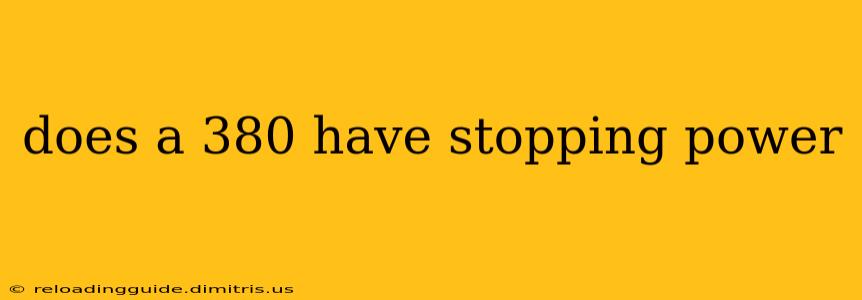Does a .380 Have Stopping Power? A Comprehensive Look at Caliber Effectiveness
The question of whether a .380 ACP (Automatic Colt Pistol) cartridge possesses sufficient "stopping power" is complex and doesn't have a simple yes or no answer. The term "stopping power" itself is somewhat ambiguous, often conflating incapacitation with lethality. Let's delve into the factors that influence a firearm's effectiveness and examine the .380's place in the discussion.
Understanding "Stopping Power": More Than Just Caliber
"Stopping power" isn't solely determined by caliber. While a larger caliber generally delivers more energy, several crucial factors contribute to a round's effectiveness in incapacitating a target:
-
Bullet Placement: Precise shot placement, particularly to the central nervous system (brain or spinal cord), is paramount. Even a small-caliber round can be instantly lethal with a well-placed shot. Conversely, multiple shots to less critical areas with a larger caliber might not produce the same immediate effect.
-
Bullet Expansion: The tendency of a bullet to expand upon impact, increasing its diameter and transferring more energy to the target, significantly influences stopping power. Hollow-point bullets are specifically designed for this purpose.
-
Bullet Velocity: Higher velocity means more kinetic energy transferred to the target, increasing the likelihood of incapacitation.
-
Total Energy Transfer: This is a combination of bullet mass, velocity, and expansion. It represents the overall energy delivered to the target.
-
Tissue Damage: The extent of tissue damage caused by the bullet's path and expansion contributes significantly to incapacitation.
The .380 ACP: A Closer Examination
The .380 ACP is a relatively small-caliber cartridge. Compared to larger calibers like 9mm or .45 ACP, it delivers less kinetic energy. This often leads to a perception of reduced stopping power. However, modern .380 ammunition, particularly hollow-point designs, can offer surprisingly effective expansion, mitigating some of the limitations inherent in its smaller size.
Factors Influencing Effectiveness of a .380
-
Ammunition Selection: Choosing high-quality, expanding ammunition designed for self-defense is crucial. Full metal jacket (FMJ) .380 rounds generally exhibit less stopping power than hollow-point rounds.
-
Firearm Platform: The platform greatly influences accuracy and reliability. A well-maintained, reliable firearm in the hands of a trained user will always perform better than a poorly maintained weapon with an untrained shooter.
-
Shooter Proficiency: Accuracy is paramount. A skilled shooter can effectively utilize a .380, while an unskilled shooter might struggle to achieve incapacitation even with a larger caliber.
Conclusion: Context Matters
The .380 ACP can be effective for self-defense, but it's crucial to understand its limitations. Its lower energy output compared to larger calibers means shot placement becomes even more critical. Reliable ammunition selection and proper training are essential to maximizing the effectiveness of any firearm, including the .380. While it might not offer the same "stopping power" as larger calibers in every situation, responsible use and adequate training can significantly enhance its effectiveness in self-defense scenarios. Ultimately, the choice of caliber should be made based on individual needs, training, and comfort level. Consult with firearms experts and consider professional training before making a decision. This information is for educational purposes only and should not be considered a substitute for professional advice.

